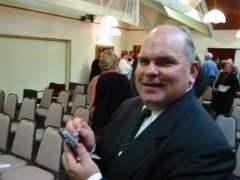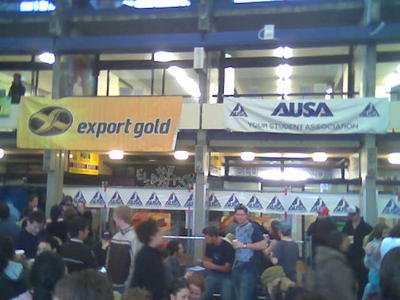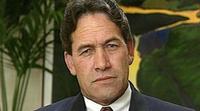 One month on from the date of the General Election and now it turns out that the so-called resolution that has been reached is quite possibility just as frustrating as the entire coalition formation process that the New Zealand public, as well as the politicians themselves, have had to endure during that time. You will most probably have heard by now that the government is officially comprised of a coalition that gives inclusion to Jim Anderton's Progressive Party, New Zealand First, and United Future. The Greens have ended up being shut out of the loop despite having campaigned, rather unashamedly mutually, with Labour. In light of the campaigning that took place, the ultimate sense of success would have been felt by the left had Labour been able to patch together a coalition that included the Greens. Unfortunately for the left, such a success has certainly not been achieved.It could be seen in fact that the new government takes a step back in terms of progressive politics in relation to that which has existed for the last three years. For all the promise of a collectively-functioning, strong left-wing force that the campaign before the election may have suggested, it is surprising that such a result has emerged after the month-long process of deliberation and negotiation. What is particularly unfortunate is that, had the Greens only gained an extra seat in Parliament, they may well have stood a significantly larger chance of being integrated into a coalition deal with Labour. There then would have been a possibility that the New Zealand public would not now have to endure such political peculiarities as they do now, such as Winston Peters holding the position of Foreign Minister whilst being outside of Cabinet. Our new Foreign Minister is not only a dangerous bigot, but indeed he's not even a part of the government proper.The Greens' omission from government certainly doesn't bode well for the relations that exist between left-wing parties in Parliament. The events that occurred during the lead-up to the election suggested that the reasonably long-established divide between the Greens and Labour, which was primarily spurred on by the GE issue, was at last being closed. As a result one was seeing the meshing-together of a more potent left in New Zealand. It was clearly evident that the two parties would have worked very effectively together in coalition, with it being rather obvious that even if they don't have the same policies, they could be perceived to share the same underlying philosophy on most issues. A Labour-Greens coalition would have been a venerable and stable one. The Labour Party, however, has discarded the potential of such a pairing coming together anytime in the near future, having yesterday made the official statement that it is turning its back on its recently-faithful friend, and needless to say this is a very heavy blow for left-wing politics in New Zealand. I pick that the concessions granted to the Greens by Labour regarding solar heaters and the launch of a Buy New Zealand Made campaign will not do a substantial amount to heal the relations between the parties.
One month on from the date of the General Election and now it turns out that the so-called resolution that has been reached is quite possibility just as frustrating as the entire coalition formation process that the New Zealand public, as well as the politicians themselves, have had to endure during that time. You will most probably have heard by now that the government is officially comprised of a coalition that gives inclusion to Jim Anderton's Progressive Party, New Zealand First, and United Future. The Greens have ended up being shut out of the loop despite having campaigned, rather unashamedly mutually, with Labour. In light of the campaigning that took place, the ultimate sense of success would have been felt by the left had Labour been able to patch together a coalition that included the Greens. Unfortunately for the left, such a success has certainly not been achieved.It could be seen in fact that the new government takes a step back in terms of progressive politics in relation to that which has existed for the last three years. For all the promise of a collectively-functioning, strong left-wing force that the campaign before the election may have suggested, it is surprising that such a result has emerged after the month-long process of deliberation and negotiation. What is particularly unfortunate is that, had the Greens only gained an extra seat in Parliament, they may well have stood a significantly larger chance of being integrated into a coalition deal with Labour. There then would have been a possibility that the New Zealand public would not now have to endure such political peculiarities as they do now, such as Winston Peters holding the position of Foreign Minister whilst being outside of Cabinet. Our new Foreign Minister is not only a dangerous bigot, but indeed he's not even a part of the government proper.The Greens' omission from government certainly doesn't bode well for the relations that exist between left-wing parties in Parliament. The events that occurred during the lead-up to the election suggested that the reasonably long-established divide between the Greens and Labour, which was primarily spurred on by the GE issue, was at last being closed. As a result one was seeing the meshing-together of a more potent left in New Zealand. It was clearly evident that the two parties would have worked very effectively together in coalition, with it being rather obvious that even if they don't have the same policies, they could be perceived to share the same underlying philosophy on most issues. A Labour-Greens coalition would have been a venerable and stable one. The Labour Party, however, has discarded the potential of such a pairing coming together anytime in the near future, having yesterday made the official statement that it is turning its back on its recently-faithful friend, and needless to say this is a very heavy blow for left-wing politics in New Zealand. I pick that the concessions granted to the Greens by Labour regarding solar heaters and the launch of a Buy New Zealand Made campaign will not do a substantial amount to heal the relations between the parties. Only contributing to the sense of farcicality surrounding the Greens' omission from government is that Labour chose the coalition partners that had, for the most part, played the game somewhat sourly -- with the exception of Jim Anderton's Progressive Party -- and shunned the Greens altogether despite the fact that the smaller party had consistently engaged in thoroughly good-natured and dedicated pledges of commitment to a Labour-led government throughout the election campaign. For a start, Winston of course blew the pre-election trumpet for New Zealand First in widely varying pitches, making a multitude of apparently-one-off statements, before finally settling on the idea that in the interests of maintaining its integrity and to "Keep Them Honest," his party would sit on the crossbenches and enter into coalition with neither National nor Labour. He also expressed on several occasions his intent to not allow New Zealand First to enter into a coalition agreement that involved the Greens, presumably for the aforementioned reasons of maintenance of integrity. In what is needless to say a futile attempt to cover his arse and make it seem that he has not comprimised his integrity, Winston is now insisting that Helen offered him the ministerial position -- he didn't ask for it. That Rodney makes known his distaste towards Winston's actions, in a reaction that shows strong similarities with the general vibe that is coming from the left, proves that both sides of the political spectrum alike are perceiving yesterday's announcements as somewhat shockingly ridiculous.
Only contributing to the sense of farcicality surrounding the Greens' omission from government is that Labour chose the coalition partners that had, for the most part, played the game somewhat sourly -- with the exception of Jim Anderton's Progressive Party -- and shunned the Greens altogether despite the fact that the smaller party had consistently engaged in thoroughly good-natured and dedicated pledges of commitment to a Labour-led government throughout the election campaign. For a start, Winston of course blew the pre-election trumpet for New Zealand First in widely varying pitches, making a multitude of apparently-one-off statements, before finally settling on the idea that in the interests of maintaining its integrity and to "Keep Them Honest," his party would sit on the crossbenches and enter into coalition with neither National nor Labour. He also expressed on several occasions his intent to not allow New Zealand First to enter into a coalition agreement that involved the Greens, presumably for the aforementioned reasons of maintenance of integrity. In what is needless to say a futile attempt to cover his arse and make it seem that he has not comprimised his integrity, Winston is now insisting that Helen offered him the ministerial position -- he didn't ask for it. That Rodney makes known his distaste towards Winston's actions, in a reaction that shows strong similarities with the general vibe that is coming from the left, proves that both sides of the political spectrum alike are perceiving yesterday's announcements as somewhat shockingly ridiculous.Winston has of course not only cheated the core values of his party but, as Rodney noted, he has cheated New Zealand First's constituency, and indeed the entire public of New Zealand in light of the wheeling-and-dealing actions that he has executed throughout the past month. It is interesting to note that, despite the concept that Winston was going to become the kingmaker and end up being desperately required by the government being perceived by most political observers as an inevitability ever since attention was first directed at the impending election, people are still fittingly appalled now that it has really happened. This could serve to emphasise the fact that the whole notion of such a finality being reached really is an exponentially bad joke. That is why we are cringing and swearing as opposed to laughing. As was kindly pointed out at Whale Oil Beef Hooked, The Australian has published some very interesting views on this particular aspect of the newly-formed coalition, accompanied by an excellent cartoon.
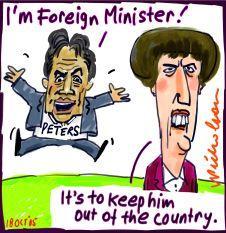
United Future have also capitalised rather lucratively on the opportunities with which the election results provided their party. Like Winston, Peter Dunne has been granted ministerial posts outside of Cabinet -- Revenue Minister and Associate Minister of Health -- in return for supporting the Labour government with a confidence and supply agreement. Peter also took a stance against the Greens similar to that which Winston did, a display of pomposity and sheer nerve that essentially suggests United Future and New Zealand First were quite intent on both having their cake and eating it too. The combined pulling power that was exerted by these two parties taking up that same stance was undoubtedly a prime contributor to the Greens' outright rejection from any governmental arrangement. Again I wish to point out that it certainly appears to me that those who were ruffians, and perceptibly came in with the intent of completely taking over the show, are the ones who have received a coalition deal. Meanwhile the Greens -- who engaged in none of the cynical tactics that New Zealand First and United Future chose to employ, and who were also relatively ideologically compatible with Labour -- have been sidelined. Something just seems wrong about this picture.
To Peter's credit though, he hardly seemed to dart from one side to the other, in an attempt to get the most lucrative deal for himself sealed, as New Zealand First did. He stuck to his guns for most of the time and it was pretty clear who he was going to go with, so long as one applies exception to the occasion where that little bit of spin was so kindly offered up by National's Gerry Brownlee. It can be rather safely assumed that it wasn't the prospect of gaining ministerial posts that caused Peter to firmly plant his measure of support on the side of Labour. This is certainly not what one would have expected from the decidedly centrist, on-the-fence United Future; if anything they should have been the single party whose allegiance was the most fluid. It's something of a testament to Peter in this circumstance that he was able to stay committed to one particular goal as opposed to partaking in wheeling-and-dealing in the vein of many of the other minor parties.
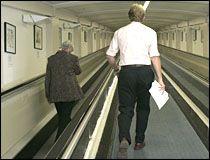 Ultimately, however, the coalition government that has finally emerged from the month's worth of negotiations is an undeniably polarised and unstable one. With the conservative influences of New Zealand First and United Future hanging over the Labour Party, it is to be expected that the leaders of the government will have a significant degree of difficulty maintaining a coherent vision which will ensure that progressive policy initiatives can continue to be implemented during this, Helen's third term. There is a distinctly disturbing sense that there is a significant amount of truth in Don Brash's statements about this government being "a dog's breakfast", accentuated by the fact that, as Don also pointed out in interviews with TVOne, Winston has a history of pulling out of tough situations. The 1996 National government in which Winston played a significant part, of course, fell apart a notable time before the full three-year term was seen out, as a direct result of Winston's actions. John Campbell really did put it well when he said, in response to negative allegations towards the nature of the media campaign for this election, "The greatest amount of cynicism this time around is in the political establishment." Perhaps the announcements of yesterday are not so much a resolution as they are the beginning of a whole lot of trouble.
Ultimately, however, the coalition government that has finally emerged from the month's worth of negotiations is an undeniably polarised and unstable one. With the conservative influences of New Zealand First and United Future hanging over the Labour Party, it is to be expected that the leaders of the government will have a significant degree of difficulty maintaining a coherent vision which will ensure that progressive policy initiatives can continue to be implemented during this, Helen's third term. There is a distinctly disturbing sense that there is a significant amount of truth in Don Brash's statements about this government being "a dog's breakfast", accentuated by the fact that, as Don also pointed out in interviews with TVOne, Winston has a history of pulling out of tough situations. The 1996 National government in which Winston played a significant part, of course, fell apart a notable time before the full three-year term was seen out, as a direct result of Winston's actions. John Campbell really did put it well when he said, in response to negative allegations towards the nature of the media campaign for this election, "The greatest amount of cynicism this time around is in the political establishment." Perhaps the announcements of yesterday are not so much a resolution as they are the beginning of a whole lot of trouble.
 Two-piece act Johnny Lightning and the Thunderbolts (thanks for the link Hanharr) treated the audience to a series of slick, sharp and catchy numbers that proved to be delectably danceable. It's performances like that that help me remember just how enjoyable simple can music be. After having listened to so much complicated material laced with time signature changes and challenging lyrical concepts in my free time, it's almost refreshing to get back to the basics and enjoy some straight-up rock. The fact that Johnny Lightning and the Thunderbolts -- featuring Rebecca on the drums and Hannah on the guitar, with both putting in awesome vocal efforts -- are a two-piece band, only serves to accentuate the numerous merits of the performance. They produced a very impressive sound indeed. As their experience builds they're bound to evolve into a great, polished act. I'd be very keen to hear them play again.
Two-piece act Johnny Lightning and the Thunderbolts (thanks for the link Hanharr) treated the audience to a series of slick, sharp and catchy numbers that proved to be delectably danceable. It's performances like that that help me remember just how enjoyable simple can music be. After having listened to so much complicated material laced with time signature changes and challenging lyrical concepts in my free time, it's almost refreshing to get back to the basics and enjoy some straight-up rock. The fact that Johnny Lightning and the Thunderbolts -- featuring Rebecca on the drums and Hannah on the guitar, with both putting in awesome vocal efforts -- are a two-piece band, only serves to accentuate the numerous merits of the performance. They produced a very impressive sound indeed. As their experience builds they're bound to evolve into a great, polished act. I'd be very keen to hear them play again.
